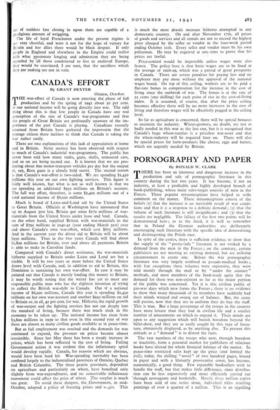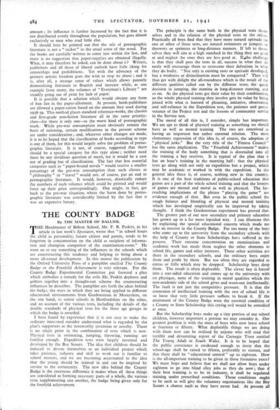PORNOGRAPHY AND PAPER
By RONALD W. CLARK
THERE has been an immense and dangerous increase in the production and sale of pornographic literature in this country during the last two years. It has become, if not an industry, at least a profitable and highly developed branch of book-publishing, whose main sales-target consists of men in the Forces. Three popular misconceptions have helped to stifle comment on the matter. These misconceptions consist of the beliefs (r) that the increase is an inevitable result of war condi- tions and that it is a response to a definite demand ; (2) that the volume of such literature is still insignificant ; and (3) that the results are negligible. The fallacy of the first two points will be demonstrated here ; as to the third, it is well to remember that in Poland the German authorities are deliberately encouraging such literature with the specific idea of demoralising and disintegrating the Polish race.
In spite of the cynics, there is sufficient evidence to show that the supply of the " pretty-lady " literature is not evoked by a demand from the men in the Forces ; on the contrary, certain publishers are not meeting an existing demand, but are utilising circumstances to create one. Before the war pornographic literature was very largely confined to pseudo-medical books ; with few exceptions these volumes were expensive, they were sold mainly through the mail or by " under the counter " methods, and most members of the book-trade agree that the demand for them was non-existent so far as the major portion of the public was concerned. Yet it is this civilian public of pre-war days which now forms the Forces ; there is no evidence to show that many thousands of its members have suddenly had their minds warped and swung out of balance. But, the cynic will persist, now that they are in uniform they do buy the stuff. This is true. But a large percentage of the troops in the country have more leisure than they had in civilian life and a smaller number of amusements on which to expend it. Their minds are open to any suggestion which will banish boredom beyond the billet-door, and they are as easily caught by this type of litera- ture, obtrusively displayed, as by anything else. To present this attitude as a " demand " is to distort the facts.
The vast numbers of the troops who now, through boredom or inactivity, form a potential market for publishers of salacious books have altered the whole financial balance of the matter. In peace-time restricted sales kept up the price (and limited the evil); today, the shilling " novel " of two hundred pages, bound in paper and with a blatantly provocative cover, has become, economically, a good thing. Few reputable booksellers wish to handle the stuff, but that makes little difference, since distribu- tion can be less expensively and more efficiently carried out 'through newsagents and bookstalls. Nearly three million copies - have been sold of one series alone, individual titles reaching printings of over a quarter of a million. This is an appalling amount ; its influence is further increased by the fact that it is not distributed evenly throughout the population, but goes almost exclusively to men who read little else. It should here be pointed out that the sale of pornographic literature is not a " racket " in the usual sense of the word. For the books are carefully' written to come just within the law, and there is no suggestion that paper-supplies are obtained illegally.
What, it may therefore be asked, can be done about Writers, publishers and all those of liberal outlook have little liking for censorships and prohibitions. Yet with the advocacy of the greatest artistic freedom goes the wish to stop its abuse ; and it is, after all, a strange sense of values which allows patently demoralising literature to flourish and increase while, as one example from many, the volumes of "Everyman's Library" are steadily going out of print for lack of paper.
It is poisible that a solution which would obviate any form of ban lies in the paper-allotment. At present, book-publishers are allowed a paper-ration based on the amount they used during 1938-39. This method places standard reference-works, the classics and first-grade non-fiction literature all in the same priority- class—for there is only one—as the worst kind of pornographic trash. While pre-war consumption must obviously remain the basis of rationing, certain modifications in the present scheme are under consideration ; and, whatever other changes are made,- it is to be hoped that the classification of books according to type is one of them, for this would largely solve the problem of porno- graphic literature. It is not, of course, suggested that there should be a special category for this type alone ; neither need there be any invidious question of merit, for it would be a case not of grading but of classification. The fact that less essential categories such as " paper-bound novels " would receive a smaller percentage of the pre-war consumption than such classes as " philosophy " or " travel " would not, of course, put an end to pornographic literature. It would, however, drastically reduce the numbers of such volumes which could be printed and would force up their price correspondingly. One might. in fact, get back to the pre-war situation, where the harm done by porno- graphic literature was considerably limited by the fact that it was an expensive luxury.



























 Previous page
Previous page